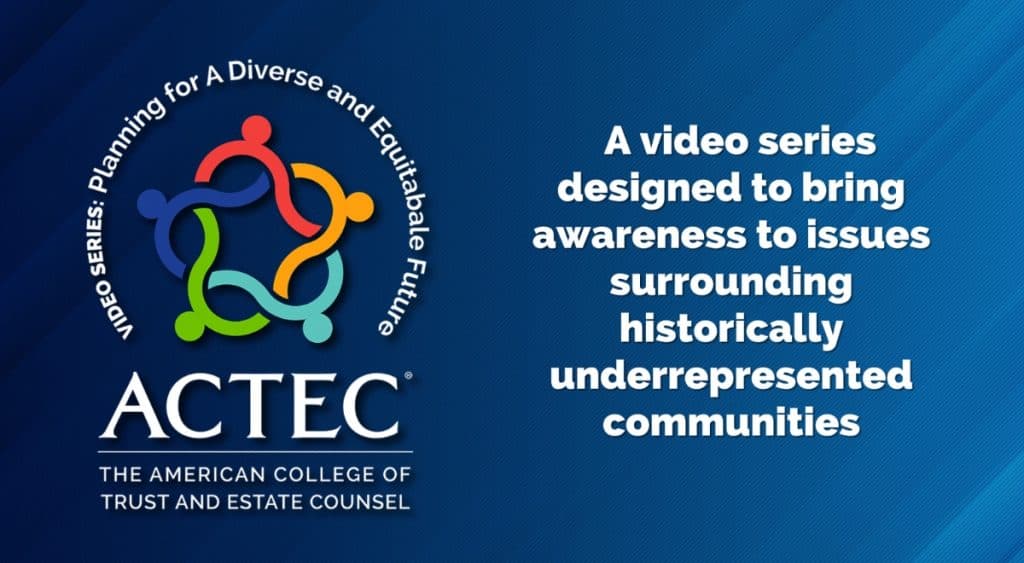ACTEC Policy Statement of Commitment to be Actively Welcoming and Inclusive of Diverse Communities, Including by Taking Active Steps to Combat Discrimination and Systemic Racism Against Minority and Marginalized Communities
ACTEC is a non-partisan, apolitical organization. However, the College considers the historical, continuing, and devastating impact of systemic discrimination against racial, ethnic, gender, LGBTQ and other minority and marginalized groups in our society to be a humanitarian, rather than a political, issue.
Individually and collectively, ACTEC condemns racism, sexism and discrimination in all its forms. ACTEC acknowledges that a failure to confront racist, sexist and discriminatory practices and policies will merely perpetuate the status quo, which continues to take the lives and dignity of our fellow human beings.
ACTEC strives to be, and publicly commits to be, actively anti-racist, anti-sexist, and anti-discrimination, and further commits to be actively welcoming and inclusive of minority and marginalized individuals and groups. Accordingly, ACTEC affirms its commitment to creating and maintaining a diverse and inclusive environment within the College. And, we commit ourselves to undertake concrete actions in our personal and professional lives to eliminate racism, sexism and discrimination.
- Statement Condemning Violence Against Asian Americans/Pacific Islanders (April 9, 2021) — ACTEC released a Statement condemning the recent spate of violent attacks against Asian-Americans and Pacific Islanders.
- Statement Condemning Racism (July 13, 2020) — ACTEC released a Press Release and Statement Condemning Racism following the shocking George Floyd incident.
ACTEC’s Diversity, Equity and Inclusivity Initiatives
- Diversity, Equity and Inclusivity Committee (March 2015) — ACTEC created a Diversity and Inclusivity Task Force in March 2012, which became today’s Diversity, Equity and Inclusivity Committee (DE&I). The committee’s mission is to develop strategies, recommendations and a comprehensive plan to help ACTEC become a more diverse and inclusive College.
- The American College of Trust and Estate Counsel’s Code of Conduct (March 2019) — The Code of Conduct offers guidance for conduct at all ACTEC activities, whether at ACTEC meetings, at other ACTEC events or during participation in telephone calls, online or via social media in connection with an ACTEC event, activity or project.
- Racism, Discrimination, and the Wealth Gap with Rochelle Riley (October 2020) — A special 90-minute discussion for ACTEC Fellows with renowned author and journalist, Rochelle Riley, author of “The Burden: African Americans and the Enduring Impact of Slavery.” The discussion focused on how racism and discrimination have contributed to wealth disparity and how that disparity is related to and impacted by our estates and trusts practices.
- Planning for a Diverse and Equitable Future (December 2020) — A monthly video series that strives to educate by discussing issues surrounding racism and offers recommendations to combat inequality. As of April 2021, the series has discussed economic inequality, transgender legal issues, slavery, purposeful philanthropy, and actions that the T&E industry can take to increase diversity in our firms. Please visit the series for the latest topics and resources.
- Becoming a Trust and Estate Lawyer (February 2021) — The trust and estate profession has a problem recruiting diverse young lawyers. Blacks, Latinx, and Asians represent less than 5 percent of all lawyers, and attorneys with the experience needed to be nominated to ACTEC are a small percentage of the law profession. To address this issue, the DE&I Committee held a special seminar for Historically Black Colleges and Universities in the DC area. Additional seminars are being scheduled in other parts of the country, and April’s Planning for a Diverse and Equitable Future video, How to Increase Diversity in the Legal Profession, presented information for law firms to address the recruitment and retention issue.
The ACTEC Foundation’s Initiatives
The ACTEC Foundation is the philanthropic arm of ACTEC and has funded projects that address issues in our society and the trust and estate profession:
- Planning for a Diverse and Equitable Future — Financial support for ACTEC’s monthly DE&I video series.
- Wills for the Underserved — Financial support for the University of Oregon School of Law’s clinic that offers practical experience to law students while helping underserved citizens with their Wills and Estate Plans. Resources are also available for other law schools to set up their own wills clinic.
- The Commons Law Center Program — Financial support for a program in Portland, OR that helps create intergenerational wealth through estate planning for a community in need.
- The Dennis I. Belcher Young Leaders Program — Financial support for an additional two years for graduates of the ABA RPTE’s Trust and Estate Fellows program. ABA RPTE is committed to ensuring that no less than half of the Fellows chosen each year are diverse.
ACTEC and The ACTEC Foundation will continue to strive for an equitable and inclusive future for our industry and world. Please take advantage of the resources mentioned above, as action is the best way to address inequality. If you have an idea or recommendation, please contact us to share it today.
Planning for a Diverse and Equitable Future

ACTEC’s diversity, equity, and inclusivity video series analyzes issues surrounding racism, sexism, and discrimination in all its forms to combat inequality.
SEARCH THE VIDEO LIBRARY